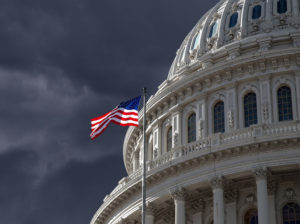Foster Failure: Proposed Amendment Puts Faith-Based Discrimination before Child Welfare

Last week the House Appropriations Committee voted in favor of a legislative amendment that would allow faith-based child welfare agencies to discriminate against LGBTQ people, interfaith couples, single parents, and others.
The amendment was added to a House funding bill and was ratified in a 29-23 vote. Should this amendment make it into the final bill, it would be a violation for the federal government and any state or local governments receiving federal funding to “discriminate or take an adverse action against a child welfare service provider” that “has declined or will decline to” provide child welfare services based on their “sincerely held religious beliefs or moral convictions.”
Faith-based organizations that operate child welfare agencies openly discriminate against LGBTQ couples and others, outright declining to hold conversations with people they perceive as violating their beliefs. This often includes same-sex and interfaith couples, single parents, as well as married couples in which one partner has been divorced. Many of these agencies specifically stipulate that couples should be a legally married husband and wife practicing Christianity, or require letters of reference from clergy.
The amendment is part of an ongoing fight to bolster religious exemptions over equal treatment under the law. Currently, nine states allow adoption agencies to discriminate against same-sex couples and others without endangering government funding. But despite this trend, the people have been fighting back. Seven states and the District of Columbia have laws that prohibit discrimination based on sexual orientation, and “religious liberty” laws have recently failed in states such as Georgia and Colorado.
In the courts, the American Civil Liberties Union sued the state of Michigan after two adoption agencies, St. Vincent Catholic Charities and Bethany Christian Services, declined to work with Kristy and Dana Dumont because they’re a same-sex married couple. The judge heard oral arguments last week but didn’t give a time frame for his ruling. And Philadelphia recently won a lawsuit against discriminatory faith-based adoption policies. In May, the city suspended foster care placements at two child welfare agencies—Catholic Social Services and Bethany Christian Services—after the agencies refused to place children with same-sex parents, violating the city’s Fair Practices Ordinance. On Friday, a federal judge ruled against Catholic Social Services, finding that the agency was in violation of not only the city law, but the terms of its own contract with the city.
Religious adoption agencies and their advocates often argue that if they refuse to stop discriminating and lose state funding, they’ll have to shut down, and the children will be the ones hurt the most. However, in Philadelphia’s case, the judge found that the city “offered evidence showing that the closure of CSS’s intake of new referrals has had little or no effect on the operation of Philadelphia’s foster care system.” When Catholic Charities, another religious adoption agency, shut down services in Massachusetts, Illinois, and the District of Columbia, there was no evidence of any change in placement rates and time in care. Taxpayers don’t need to be funding these faith-based institutions in order for foster and adoption services to function, but states desperately need federal funding to keep all of their adoption programs afloat.
All of this could be moot if the amendment approved by the House last week is implemented. States that have outlawed discrimination under the guise of “religious liberty” and penalize faith-based adoption agencies that do so will be in danger of losing federal adoption funds. The amendment stipulates that 15 percent of federal adoption funding will be withheld from these states.
Nearly 400,000 children nationwide are in need of foster care, and LGBTQ youth are largely overrepresented in the foster-care system, predominantly due to family rejection. They are particularly vulnerable to discrimination and mistreatment, especially if placed by discriminatory religious agencies into discriminatory religious families. These organizations hold their beliefs above the wellbeing of children in their care and often to their detriment. In addition to turning away qualified prospective parents, some states allow agencies to refuse medical treatment to LGBTQ youth and subject them to conversion therapy. Faith-based child welfare agencies have proven that they cannot adequately provide professional services to youth they’re responsible for, and as a basis, should not be contracted by states to provide such services, let alone be given priority over constitutionally established civil rights.
